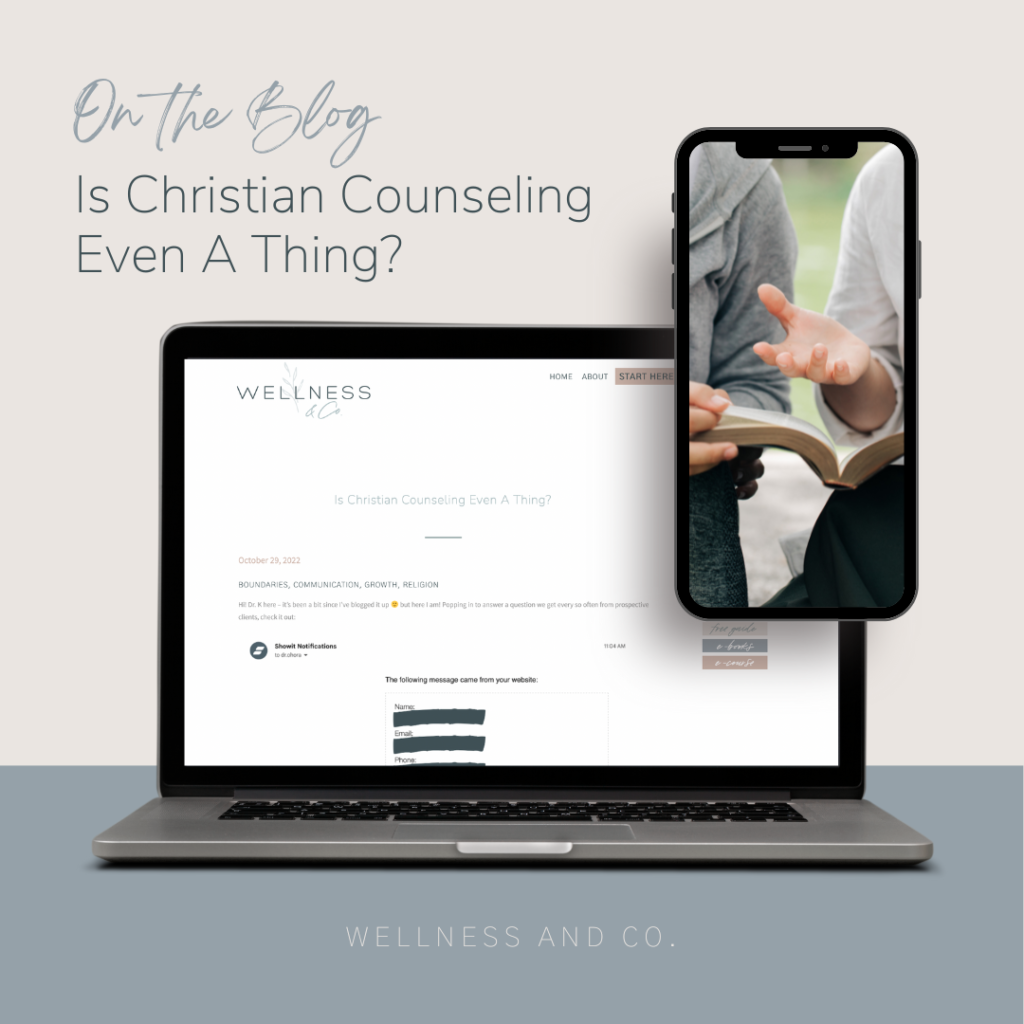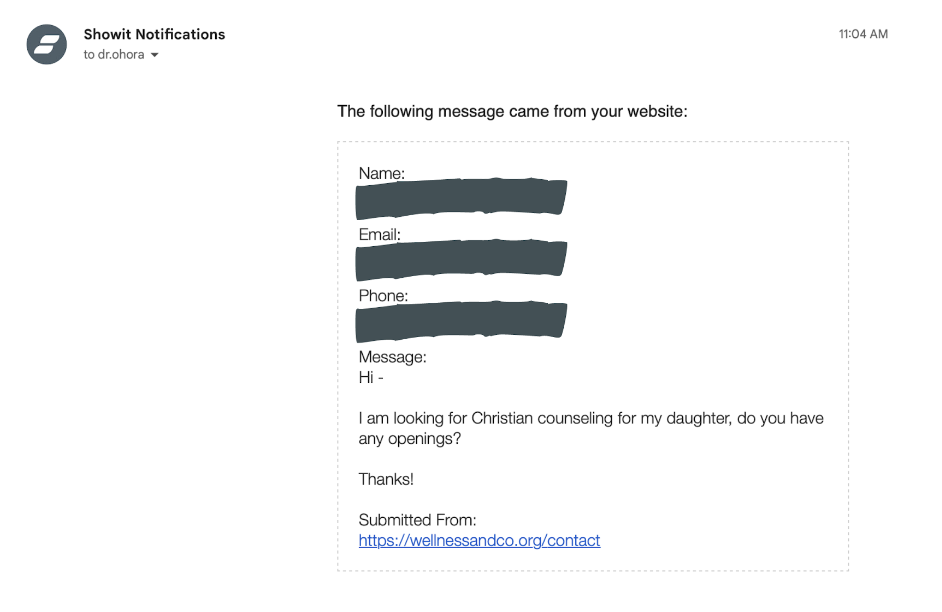Follow
Wellness & Co.
Hi, I'm Dr. K, Wellness & Co. is a growing therapy/coaching practice and educational hub for prospective clients based in Maryland and virtual clients all over the world!
Hi, I'm Dr. K
free guide
e -books
e -course
Is Christian Counseling Even A Thing?
November 1, 2022

Hi! Dr. K here – it’s been a bit since I’ve blogged it up 🙂 but here I am! Popping in to answer a question we get every so often from prospective clients, check it out:

This is a question that is totally normal to ask and yet, a bit trickier to answer.
So, let’s dive in with a breakdown of the response I gave and why.
What Are You REALLY Asking?
In the mental health world, the marketing of “Christian counseling” is kind of a mixed bag. There is no such thing as “Christian Counseling” from a licensing standpoint. Meaning, in the State of Maryland (and to my knowledge, all other states), no one has a license with this title or designation.
Often, when people ask this question they are wanting to know one of three things:
(1) is the practice owned and operated by a Christian and/or are the providers themselves Christian,
(2) is the therapist going to sway our work in some direction – either toward my faith leaning or away from it, or,
(3) are the providers trained in faith-based modalities?
First, the Million Dollar Question – Are You a Christian?
(1) Is the practice owned and operated by a Christian and/or are the providers themselves Christian?
At times, a prospective client wants the knowledge or comfort that their provider is a Christian. This could be because they may trust a provider more who identifies similarly (more on that later) or because they have expectations associated with a provider who identifies as a Christian.
Interestingly, I’ve also had clients sit down and say: “You’re not a Christian and are going to tell me how to live my life based on the Bible, right? Because I’m Atheist.”
Here’s how I answered the first implied question in the email:
(1) I own and operate the practice and do identify as a Christian. Several of my providers also identify as Christian but I respect their decision in who to share that with and to what extent sharing is clinically appropriate for their clients’ own growth journey.
Keep in mind that just because a provider identifies as Christian does not mean they subscribe to the same values, morals, or paradigm that you do. Christianity is a broad term and having a meaningful conversation about why you would prefer to work with a Christian may help you unpack what underlying expectations you are associating with the service.
In addition, quality providers are highly skilled at knowing what they should/should not share with clients. Sometimes we do share a personal experience, belief, or opinion but we do so with a lot of forethought and intentionality into how it best serves the client and their long-term health journey. Therefore, a provider may choose not to share their faith perspective for a strategic purpose and at our practice, I respect that clinical discernment.
Next, the Underlying Fear – I’m Worried You’ll Be Biased!
(2) Is the therapist going to sway our work in some direction – either toward my faith leaning or away from it?
The second thing prospective clients are often trying to figure out is if their provider is not a Christian, could that sway their growth or progress in a way that misaligns with their values?
Here’s what I had to say:
(2) All licensed therapists in the United States should be trained to work with any religion, spirituality, or faith leaning. I am intentional about hiring providers who I believe can display a level of cultural competence no matter what belief system a client is working with.
Often, we [as providers] assess for religion/spirituality at an intake appointment to determine its level of involvement in the clients life. We also will inquire about how the said belief system impacts aspects of growth, healing, and treatment. For example; if discussing a wound in a client’s life, I might inquire how their belief system addresses forgiveness, reconciliation, letting go, and setting healthy boundaries.
Our goal is always to work within the clients paradigm and worldview. That being said, therapists are also trained to “push back” to a healthy/appropriate extent. This is to help the client refine and solidify their views and perspectives and integrate them into their decision-making. It should not be done in an effort to change their mind about their beliefs, per se. For example, if a client identifies as a Christian and regularly expresses intense bouts of anger using Jesus’ flipping of the tables as a defense for their “righteous anger”, I might “push back” and ask them to explore this piece of their belief system further and consider what else their belief system says about anger, joy, vengeance, etc.
I will add that right now our culture does push certain ideologies quite aggressively and that’s being infused into mental health, too. So, it’s wise of you to make sure the providers you work with are competent in treating within the worldview you prescribe to.
Hopefully that clarifies that all providers should be culturally competent. Here’s a quick run down of what cultural competence means, which applies to all mental health disciplines, from Teva Johnstone’s substack on Gender Identity and Cultural Competence:
In the discipline I was trained—social work—we are supposed to practice cultural competence. At various times in our field’s history this ethical principle has gone by different names like cultural humility. It means just how it sounds: social workers should know that our clients come from different backgrounds, seek to gain awareness about the backgrounds to which they belong and how this belonging influences their psychology & behavior. We should not make assumptions, we shouldn’t be a jerk, we should respect differences, we should not push beliefs or behavior onto those who are different from us culturally…
Cultural competence applies to practicalities too: if someone wants us to take off our shoes before entering their home and it doesn’t kill us to do so, we should do it. We should understand that cultures use eye contact differently and that cultures influence parenting and wellness practices.
You get it.
Finally, Can You Help Me Grow Based on My Beliefs?
The last, somewhat indirect question prospective clients are asking when they want Christian counseling is: (3) are the providers trained in faith-based modalities?
AKA: Can you help me grow based on, and using, MY beliefs?
So, here’s my response that helps give the low-down on how faith-based change unfolds –
(3) Faith based modalities are taught primarily in pastoral counseling graduate programs. However, some graduate programs make a point to teach faith-based courses or models even if they aren’t a pastoral counseling program. Much of the faith-based modalities that exist are self-taught, though. And to be transparent, some of the most effective modalities are not necessarily faith-based but more generic and then a faith-based perspective can be interlaced or overlayed onto the model. For example, Cognitive Behavior Therapy is not faith based but can easily be integrated with a clients’ religion/spirituality.
Another important anecdote: research most often informs what providers are taught about change/growth. Research is impacted by $$ and social/political/other motivations. If you are aware of a specific faith-based modality and want the provider you work with to use that process for change, it’s best to be direct. For example, the Biblical Counseling Model, which has the strongest critique of modern psychology, may be your preferred approach to change and you can always ask your provider if they are aware of it and use it in their clinical practice.
Talk About Christian Counseling With Your Provider, OK?

At the end of the day, we encourage all clients who subscribe to a particular worldview to have intentional and meaningful conversations with their provider around:
-how this worldview impacts their day to day life,
-what this worldview means to their growth journey, and
-to what extent having a provider that subscribes to the same worldview can help/hurt the growth process
A solid provider will be able to assess, engage, and explore these three conversations with a client. And sometimes it takes a few sessions to determine if the provider is the best fit for your long-term growth journey.
What Other Questions Do You Have?
This blog is not exhaustive to all the underlying meaning that could be packed into the question – Do You Offer Christian Counseling? Have other questions? I’d love to answer them in future posts, comment below or send us a message on FB or IG!
Christian counseling is somewhat of a misnomer in the mental health field. To be clear, churches and church-affiliated counseling/support programs operate very differently and may have a different approach/answer to this question. Some churches have licensed mental health professionals, some do not. To learn more about *some* of the perspective that exists within churches and the field of pastoral counseling, check out Tim Keller’s breakdown of the Four Models of Counseling in Pastoral Ministry.
Don’t forget that you are WISE to ensure that the provider you choose has the capacity to work within the worldview you subscribe to with cultural competence. This doesn’t mean they won’t have questions, curiosities, or concerns but that they know how to work with their own bias as well as engage your bias meaningfully and intentionally.
That’s all for now,
-Dr. K
Interested to learn more? Start here.
Dr. K started Wellness & Co. with the desire to provide top-notch therapy to our local community. Now, Wellness & Co., has therapists, coaches, tutors, and professional organizers – all to provide wrap-around, boutique style care to our clients. Dr. K specializes in couples therapy, healing from infidelity, and supporting individuals through relational transitions.
Leave a Reply Cancel reply
CONTACT
Start Here
BLOG
OUR TEAM
SHOP
ABOUT
©2025 Wellness & Co. | All Rights Reserved | Design by EverMint Design Studio
BACK TO TOP
connect with us on instagram
